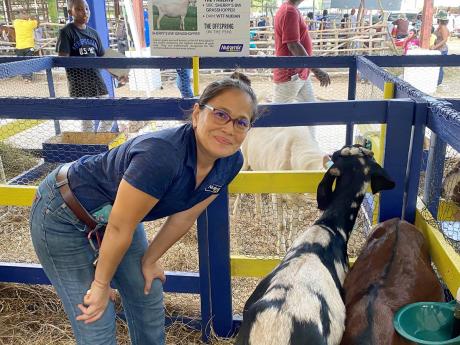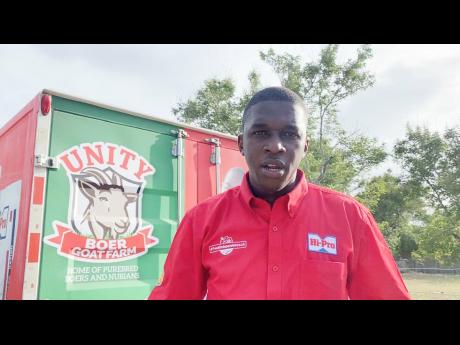Farmers breed success with better meat, milk
Years after initial hesitancy when the local artificial insemination (AI) push began, goat farmers across the island are now rejoicing at the noticeable improvement in their herds. AI has been helping local goat, cattle and pig farmers to improve...
Years after initial hesitancy when the local artificial insemination (AI) push began, goat farmers across the island are now rejoicing at the noticeable improvement in their herds.
AI has been helping local goat, cattle and pig farmers to improve genetics and save on cash to feed their animals as no bull is needed. They also need less veterinary and technical assistance.
Jamaica took its first major step towards having farmers utilise AI techniques in 2015, when organisations such as the Food and Agriculture Organization began playing a more active role in improving the production and productivity of livestock development in the Caribbean, including in Jamaica. The United Nations agency facilitated workshops on small ruminant breeding technologies with a focus on AI in goats.
In 2021, the Ministry of Agriculture launched a $50-million National Small Ruminant Development Programme and companies such as Newport Mills – makers of the popular animal feed brand Nutramix – and Hi-Pro later pumped millions into their respective AI programmes, making semen and embryos for small ruminants available locally to help farmers.
Among the breeds both companies have managed to help the goat farmers to produce are Boer or Boerbok, Anglo-Nubian, Kalahari Red and Saanen.
Dr Gabrielle Young, senior manager for the Livestock Support Unit at Nutramix, said farmers have been able to use the brand’s products to maximised productive capability and get superior genetics for better breeds with no risk of inbreeding. Farmers are also seeing better efficiency and more productivity, she said.
“We are using a lot of imported semen of goats, cattle and pigs. We are just showing what artificial insemination can produce – the quality of the offspring. They grow better and they produce more milk,” Young said before showing The Gleaner two high-quality Red Boers inside a pen at the Denbigh Agricultural, Industrial and Food Show on Sunday
“The Saanen are the champion milking goats. They produce anywhere from three to four litres per day,” she explained.
Proof of success
Hi-Pro animal nutritionist Khalil Brown told The Gleaner that things have been going well since the company brought in semen around two years ago. The high-quality goats competing at the Denbigh show were proof of the success of the programme, he said.
“The breeds have improved so much, and it’s not particular to one farmer. Multiple farmers have what we think is global standard-looking Boer and Nubian goats,” Brown said.
“We brought in Boer, Nubian and Saanen. Our aim was to improve the genetic profile of the animals here locally. We’re looking at improving the average daily gain of the animal, the characteristics of the breed [and] also milk production,” he pointed out.
According to Brown, Hi-Pro is now eyeing genetic material from Australia to further improve the characteristics of local breeds.
“We’re looking to bring in a new breed, never before to the country – the Kalahari Red and Black. Also the Boer and some Nubian, and I believe this will really change the landscape again for the goat industry,” he told The Gleaner.
Brown said that farmers have now embraced Hi-Pro’s AI programme, especially since the Government has been partnering for the importation of semen.
Goat farmer Neil Shand, who owns Shand’s Farm in St Ann, said the AI programme has given him quality herds and has enabled him to win the Best Under One-Year-Old Pure-Bred Nubian Goat category and come in second in Best Over One-Year-Old Pure-Bred Nubian Goat section at the Denbigh show this year.
“The results of artificial insemination are amazing,” he said, calling AI “a very good thing”.
He told The Gleaner: “Instead of us constantly using the same genetics, it diversifies the genetics, so I definitely encourage artificial insemination.”
Shand, who has been engaged in goat farming for 11 years, said the offspring from the AI programme with Nutramix have shown increased growth and milk yield rates.
Dain Brown, whose entrant won the Best Under-Two-Year-Old Pure-Bred Nubian Goat, is grateful that he was introduced to the AI programme, adding that since his first yield of an American Nubian goat, his line of production has been improving.
“The structure is by far, far different from what I’m used to, definitely a plus. He has greater length and width, muscles [and] everything for a Nubian,” he said. “Some issues that we had with Nubians, when they are on heat, the males don’t eat for a period of time, meaning months when the breeding season is on … . So their body structure is far different.”


